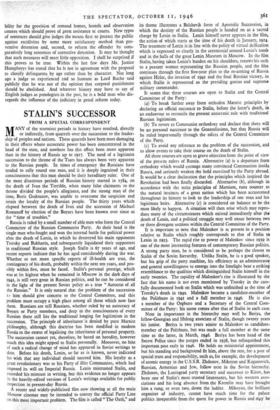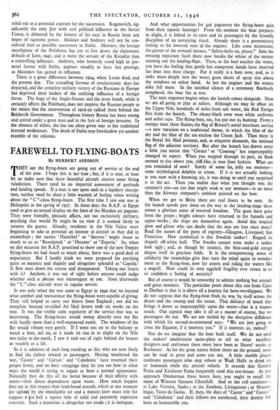STALIN'S SUCCESSOR
FROM A SPECIAL CORRESPONDENT
MANY of the stormiest periods in history have resulted, directly or indirectly, from quarrels over the succession to the leader- ship of peoples and nations. These quarrels have been most damaging in their effects where autocratic power has been concentrated in the head of the state, and nowhere has this effect been more apparent than in the history of Russia up to 1917. The need of a legitimist succession to the throne of the Tsars has always been very apparent to the Russian people. In times of emergency the Russians have tended to rally round one man, and it is deeply ingrained in their consciousness that this man should be their hereditary ruler. One of the most disastrous periods of Russian history started in 1584, on the death of Ivan the Terrible, when many false claimants to the throne divided the people's allegiance, and the strong man of the time, Boris Godounov, was unable to overcome the suspicion and retain the loyalty of the Russian people. The thirty years which elapsed between the death of Ivan and the accession of Michael Romanoff by election of the Boyars have been known ever since as the "time of troubles."
Russia is ruled by a small number of able men who form the Central Committee of the Russian Communist Party. At their head is the single man who fought and won the internal battle for political power after the death of Lenin, in which he destroyed his main opponents Trotsky and Bukharin, and subsequently liquidated their supporters in traditional Russian style. Joseph Stalin is 67 years of age, and recent reports indicate that he has aged considerably during the war. Whether or not more specific reports of ill-health are true, the contingency of his death, probably within the next ten years, and pos- sibly within five, must be faced. Stalin's personal prestige, which was at its highest when he remained in Moscow in the dark days of 1941, is still very great in Russian politics, and he can be considered in the light of the present Soviet policy as a true "Autocrat of all the Russias." It is only natural that the problem of the succession LI him should give concern to the Central Committee, and this problem must occupy a high place among all those which now face them. Russians are still Russians, whether ruled by an autocracy of Boyars or Party members, and deep in the consciousness of every Russian there still lies the traditional longing for legitimism in the succession. The principle of inheritance' is denied by pure Marxist philosophy, although this doctrine has been modified in modern Russia to the extent of legalising the inheritance of personal property. The succession cannot yet, therefore, be based on heredity, however much this idea might appeal to Stalin personally. Moreover, no hint of such a radical change of mind has appeared in Soviet writings to date. Before his death, Lenin, so far as is known, never indicated his wish that any individual should succeed him. His loyalty as a great revolutionary was to his Party of elite Communists, which had imposed its will on Imperial Russia. Lenin mistrusted Stalin, and recorded his mistrust in writing, but this evidence no longer appears in the heavily-edited versions of Lenin's writings available for public inspection in present-day Russia.
A recent and widely-publicised film now showing at all the main Moscow cinemas may be intended to convey the official Party Line on this most important problem. The film is called "The Oath," and its theme illustrates a Bolshevik form of Apostolic Succession, in which the destiny of the Russian people is handed on as a sacred charge by Lenin to Stalin. Lenin himself never appears in the film, the action of which starts at the time of his death in January, 1924. The treatment of Lenin is in line with the policy of virtual deification which is expressed so clearly in the ceremonial around Lenin's tomb and in the halls of the great Lenin Museum in Moscow. In the film Stalin, having taken Lenin's burden on his shoulders, renews his oath to a peasant woman representing the Russian people, and the film continues through the first five-year plan to the re-arming of Russia against Hitler, the invasion of 1941 and the final Russian victory, in which Stalin is represented as the presiding genius and supreme military commander.
It seems that three courses are open to Stalin and the Central Committee of the Party : (a) To break farther away from orthodox Marxist principles by declaring an official successor to Stalin, before the latter's death, in an endeavour to reconcile the present autocratic rule with traditional Russian legitimism.
(b) To revert to Communist orthodoxy and declare that there will be no personal successor to the Generalissimo, but that Russia will be ruled impersonally through the edicts of the Central Committee of the Party.
(c) To avoid any reference to the problem of the succession, and to allow events to take their course on the death of Stalin.
All three courses are open to grave objection from the point of view of the present rulers of Russia. Alternative (a) is a departure from orthodoxy which would estrange many convinced Communists inside Russia, and seriously weaken the hold exercised by the Party abroad. It would be a clear declaration that the principles which inspired the Revolution had been finally discarded. Alternative (b), although in accordance with the strict principles of Marxism, runs counter. to the natural instincts of a great nation which has been accustomed throughout its history to look to the leadership of one man and his legitimate heirs. Alternative (c) is considered on balance to be the most likely to happen. A situation will then arise which may repro- duce many of the circumstances which existed immediately after the death of Lenin, and a political struggle may well ensue between two or three divergent sections within the Central Committee of the Party.
It is important to note that Malenkov is at present in a position relative to Stalin which roughly corresponds to that of Stalin to Lenin in 1923. The rapid rise to power of Malenkov since 1939 is one of the most interesting features of contemporary Russian politics. A strong party man, he is considered to be perhaps the closest to Stalin of the Soviet hierarchy. Unlike Stalin, he is a good speaker, but his grip of the party machine, his efficiency as an administrator and general unwillingness to emerge into the limelight bear a striking resemblance to the qualities which distinguished Stalin himself in the early twenties. The rapidity of Malenkov's rise is illustrated by the fact that his name is not even mentioned by Trotsky in the care- fully documented book on Stalin which was unfinished at the time of Trotsky's death in 1940. Malenkov became a candidate-member of the Politburo in 1941 and a full member in 1946. He is also a member of the Orgburo and a Secretary of the Central Com- mittee of the Party: his name comes after that of Stalin in each case.
Next in importance in the hierarchy may well be Beriya, the fellow-Georgian and lifelong associate of Stalin, though twenty years his junior. Beriya is two years senior to Malenkov as candidate- member of the Politburo, but was made a full member at the same time as the latter, in March, 1946. Beriya has been head of the Secret Police since the purges ended in 1938, but relinquished this important post early in 1946. He holds no ministerial appointment, but his standing and background fit him, above the rest, for a post of special trust and responsibility, such as, for example, the development of atomic energy in the U.S.S.R. Zhdanov, Mikoyan and Kaganovich, Russian, Armenian and Jew, follow next in the Soviet hierarchy. Zhdanov, the Leningrad party secretary and successor to Kirov, has been one of Stalin's most trusted lieutenants, but his western asso- ciations and his long absence from the Kremlin may have brought him a rung, or even two, down the ladder. Mikoyan, the brilliant organiser of industry, cannot have much time for the palace politics inseparable from the quest for power in Russia and raw be
ruled out as a potential aspirant for the succession. Kaganovich, sig- nificantly the only Jew with real political influence in the Soviet Union, is debarred by the history of his race in Russia from any hopes of supreme power. Molotov and Andreev will not be con- sidered here as possible successors to Stalin. Molotov, the foreign mouthpiece of the Politburo, has yet to live down the diplomatic debacle of June, 1941, and is more the servant of the Kremlin than a controlling influence. Andreev, who formerly stood high in per- sonal favour with Stalin, appears steadily to have lost prestige, as Malenkov has gained in influence.
There is a great difference between 1924, when Lenin died, and the present day. The crusading fervour of revolutionary days has departed, and the complete military victory of the Russians in Europe has deprived their leaders of the unifying influence of a foreign threat. The bogy of the Anglo-Saxons and the atom bomb, while it certainly affects the Politburo, does not impress the Russian people to the extent that the intervention of 1919-20 rallied them behind the Bolshevik Government. Throughout history Russia has been strong and united under a great man and in the face of foreign invasion. In the absence of either, she has too often given way to her traditional internal weaknesses. The death of Stalin may foreshadow yet another stumble of the colossus.































 Previous page
Previous page